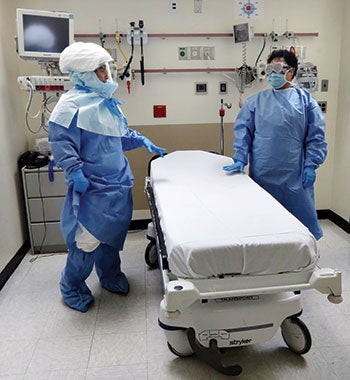Health care groups offer online resources for Ebola preparedness
 |
| AP PHOTO/RICHARD DREW Wearing the correct personal protective equipment around Ebola patients is critical to prevent health care workers from becoming infected. |
The urgency of preparing for and responding to patients even suspected of having Ebola became evident last month when a U.S. health care worker, who had helped to treat a patient who was diagnosed with Ebola and subsequently died in a Dallas hospital, became infected herself.
The diagnosis of the nurse set off a wave of anxiety among health care workers throughout the nation as questions surfaced about their own level of preparedness for treating Ebola patients. The American Hospital Association (AHA) is urging hospitals to be ready for what appears will be an ongoing health care challenge.
"Hospitals prepare for all types of emergencies in order to care for their patients and communities," says Roslyne Schulman, director of policy development, AHA. "Every hospital has plans in place to care for patients with infectious diseases and hospitals across the nation will continue to update their policies as we learn more."
A number of health care organizations and infection control associations have made a wide range of online resources available to prepare health care workers and operations staff to work safely around an Ebola patient.
The AHA has developed a website housing advisories and resources and directing health care staff to the Centers for Disease Control and Prevention (CDC), World Health Organization and other websites for information on Ebola preparedness at www.aha.org/advocacy-issues/emergreadiness/ebola.shtml.
The AHA encourages hospitals to share the CDC checklist and their respective facility's plan "with their medical and nursing leadership, emergency department, emergency management staff, infection control practitioners, employee health services, environmental services and materials managers to ensure that everyone is doing his or her part to follow current guidelines," Schulman says.
The Association for the Healthcare Environment website also offers resource links and guidance for environmental services professionals on Ebola preparedness at www.ahe.org by clicking on the Ebola Reference link on the right side of the home page.
On that page you can find information taken directly from the CDC's Frequently Asked Questions related to environmental infection control. Issues covered include:
• Determining whether a particular EPA-registered hospital disinfectant is appropriate for use in a room with an Ebola patient;
• How to manage spills of blood and other bodily fluids;
• Whether there are special instructions on cleaning and disinfecting a room with a suspected or confirmed Ebola patient and much more.
Other information on Ebola can be found at:
• Association for Professionals in Infection Control and Epidemiology — Resources on Ebola Virus Disease: www.apic.org/Professional-Practice/Practice-Resources/Ebola-virus-disease
• Society for Healthcare Epidemiology of America — Ebola infection control resources: www.shea-online.org
• World Health Organization — Ebola resources: www.who.int/csr/disease/ebola/en.


